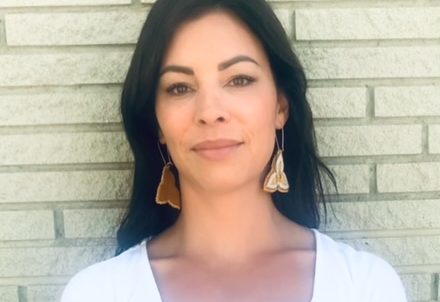Helping close the gap on psychiatry shortages
Posted on July 21, 2021
Dr. Zoe Michano-Furlotte, NOSM alumna (MD 2016, BScN Lakehead University), completed her fourth year of residency in psychiatry in Thunder Bay and is entering her fifth and final year. Zoe is a member of Biigtigong Nishnaabeg and is from the town of Caramat, which is now part of the community of Greenstone.
“I’m hoping to work at the Thunder Bay Regional Health Sciences Centre and provide outreach care with regional Indigenous communities to work together to improve access and mental health services,” says Zoe.
“I have a bigger dream to expand my practice to specialize in Indigenous mental health and women’s perinatal and postnatal mental health, with a focus on intergenerational trauma,” she explains.
Zoe recently completed an elective through the Women’s College at Mount Sinai with the prenatal program. She says being able to complete her residency at NOSM is the main reason she was able to advance her career.
“I’m very family-oriented and it is very important to me that I could complete my residency at home here in Northern Ontario at NOSM,” she says. “It is important to me that I can be here for my nephews and niece. I am close to my parents, my sister and my grandmothers. My supportive fiancé and family are huge factors for me to be successful in my residency program.”
She says NOSM residency is unique because it is flexible and her preceptors made her feel part of a family. Zoe is close to the program director and site director, describing them as very supportive. “I don’t think this is the experience in larger psychiatry programs in Toronto and elsewhere in Ontario.”
As an MD alumna, what stands out most to Zoe about the NOSM MD program were the experiences in Indigenous communities. “That’s something we’re working on in the psychiatry residency program—developing an Indigenous stream for psychiatry collaboration with the University of Toronto and McMaster University,” says Zoe.
The challenge now is the lack of psychiatrists across all of Northern Ontario and the critically long wait lists for care.
“Sadly, we don’t have enough psychiatrists in Thunder Bay. That begs the question, how can we offer outreach psychiatry care to rural and remote communities when we cannot provide enough mental health services in our tertiary centres? Also, to access residency electives in rural communities we must have enough staff psychiatrists to support teaching,” Zoe says. “I have optimism that this will change in the future as many new psychiatrists have stayed to practise at the Thunder Bay Regional Health Sciences Centre.”
Her dream is to be part of filling the gap in care, addressing change and advocating for more psychiatrists in Northern Ontario who plan to stay in the North to deliver care. “My ultimate goal is to be able to go to communities and bring care to them.”
She highlights significant improvements that have been made by health partners, including St. Joseph’s Care Group in Thunder Bay and the Thunder Bay Regional Health Sciences Centre who have actively recruited more psychiatrists in recent years. However, Zoe says with the increasing demand coupled with the pandemic, there is a need for the province to ramp up increased funding and psychiatric care. There is also room to grow out-patient services for specific programs including renal, cancer and maternal care, and specifically for outreach to patients in rural, remote communities.
“What’s exciting is that I know a lot of the junior psychiatry residents are planning to stay here, so that’s wonderful. It’s a sign that there is more to come and opportunities through effective therapeutic alliances. However, critical issues need to be addressed as soon as possible. For example, the disproportionate rates of suicidal ideation and suicide in Indigenous populations, which are five to seven times higher than the general population.”
Zoe says the key is to offer proper access to care by improving relationships that acknowledge the violence of colonization and residential school intergenerational trauma, which have led to high rates of mental illness.
“Identifying the impact colonization and residential school had on my family, drives me to want to learn more, support one another and makes me really want to help. This work is very meaningful in my life. I definitely have a willingness to do more research, make those connections and meet with people to ask them what the community needs, then try to advocate with them,” says Zoe.
“Medicine has been a decade of my life’s work but it doesn’t feel like it. Learning and growing is part of my goal. My elective with Dr. Diane Whitney [outgoing Psychiatry Program Director at NOSM] was a turning point for me, and it’s important to do what you’re passionate about. I’m just so lucky that I found psychiatry.”


